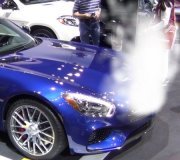"Just replacing sensors" is a big waste of their time and money unless it fixes the problem. You would know that when you drive away from the dealership and the warning lights are off and everything is working properly.
For the new problems there are going to be diagnostic fault codes stored in the Engine and Anti-lock Brake Computers. Without knowing what the first engine code was, there's no way to know if you have the same problem or a new one. If it's the same code as before, if a sensor is referenced in that code, it is only the cause of it about half of the time. The other half there could be wiring problems related to it. Typically they will just replace the part to get the car back to you faster, and they'll hope that takes care of it. When it doesn't, you have to make a return trip and they have to look further. Also, it isn't that uncommon to get a defective new part. They don't have any control over that except to replace it again.
For the ABS light, by far the most common problem is minor play in a front wheel bearing. GM has had a lot of trouble with them for many years. The play that develops is completely normal but in this case the wheel speed sensors develop a pretty wimpy signal to begin with, and with the little play in the bearing, it reduces even further the strength of that signal. When the signal gets weak enough that the computer can't read it, it sets a fault code, turns the system off, and turns the warning light on to tell you. You can further verify that by watching the live data display on a scanner during a test drive. You'll see one of the front wheel speeds drop to 0 mph while the other three read properly.
It's real important to understand with this type of problem that most of the time once a signal is lost and a fault code is set, many of the other self tests are halted because they need that missing signal for comparison. If you have the problem repaired fairly soon, that's usually the end of it, but if you put it off for weeks or months, a second problem, (typically the other front wheel bearing), will develop the same problem but it won't be detected by the self trests, and there won't be any fault code related to that second problem.
This is where it gets real frustrating for owners and mechanics. When you finally take the car in for a diagnosis, all the mechanic has to go on is the one fault code, so he gives you a repair estimate for the one wheel bearing. It's not until he goes on the test-drive that the other self-tests resume and the second problem is detected. The warning light turns back on and he has to start all over with the diagnosis and tell you more parts are needed. My reason for telling you this is to avoid that frustration in the future. These wheel bearings can develop problems in as little as 15,000 miles but it's more common to need new ones around every 50,000 miles. Those old bearings will work fine on a similar car without anti-lock brakes.
The Traction Control system is an add-on feature to the anti-lock brake system, so even though that warning light is on, it's unlikely there is a second problem in that system. Fix the ABS and the traction control system will work again.
We know that your state has some really strange rules related to lemon laws, but that doesn't apply to your car. You likely have some type of warranty, usually 30 days, included by the dealer, and most commonly that only covers half the cost of repairs. Basically you pay the actual cost of repairs which is half of their bill, (that helps you out), and the dealer doesn't lose any money but they don't make any profit either. They DO lose when your repair ties up the mechanic and equipment which can't be used for another customer.
In most states the lemon laws state you can request a refund if your car is in for the same repair three times while it's under the manufacturer's base warranty, usually 12 months, or it's out of service for a certain number of days. A lot of people think they'll get all of their money back, but they will deduct the depreciation due to the age and mileage and refund the value of the car after that. It would be the same as if you had rented that car for the length of time you owned it. The laws in your state include provisions for crushing cars that aren't repaired within their guidelines. That doesn't benefit anyone, but our politicians know what's best for us.
You may have some type of lemon law for used cars but in most states they only involve new cars. There's usually limitations too for real high warranty periods. If a new car has a 100,000 mile power train warranty and the same thirty-dollar sensor fails three times, 30,000 miles apart, there's no chance they're going to call that a lemon.
Saturday, June 20th, 2020 AT 12:29 PM
(Merged)


